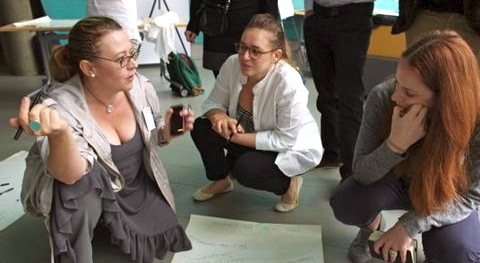
Non vedo l’ora che cominci #LOTE2. Parteciperanno alcune delle persone più interessanti che conosco: e se non bastasse, stiamo montando un bellissimo programma, interattivo e no-spectator-allowed. La mia parte preferita è la Policy Hero Challenge: l’idea è di prendere alcune delle raccomandazioni generate dal progetto Edgeryders e dare loro la forma di politiche pubbliche. Processi possibili, seri, compatibili con la normativa, accountable; roba che potrebbe essere presa così com’è e portata in Parlamento – o diventare una decisione amministrativa di qualche dirigente. Di solito i cittadini – anche quelli molto intelligenti – non sono in grado di fare questo. Quindi, a ogni sessione parteciperà almeno una persona che lavora nelle istituzioni. Il suo compito è è non permettere alla sessione di assumere un atteggiamento semplicistico.
Lasciatemi fare un esempio. Abbiamo una sessione su “ricablare le politiche per l’innovazione”. Molti edgeryders pensano che le politiche europee dell’innovazione si perdano l’occasione di sostenere persone innovative: non le vedono nemmeno, perché sono concentrate le organizzazioni. Come potrebbe essere una politica per l’innovazione centrata sugli individui? Immagino che la sessione comincerà circa così:
“CITTADINO: “I governi vogliono solo dare grandi progetti a grandi imprese high tech. Tutti sanno che non sono questi i soggetti più innovativi. Dilbert lavora per una grande impresa high tech! Stiamo davvero dicendo che ha senso finanziare il capo di Dilbert per produrre innovazione?”
POLICY MAKER: “Piano. Dobbiamo rendere conto di ogni centesimo, e questo è bene. Ora, le grandi organizzazioni sanno fare a spendere denaro del contribuente: hanno sistemi di contabilità sofisticati e possiedono beni di valore – quindi, se non producono risultati, possiamo sempre fare loro causa e recuperare il denaro. Per esempio, nel 2009 c’è stato un episodio sgradevole in cui alcune piccole imprese hanno montato una specie di truffa […] Certo, se avessimo indicatori affidabili della qualità dei progetti ex ante, potremmo correre qualche rischio in più sull’amministrazione in cambio della certezza di sostenere i progetti migliori, ma misurare la qualità di un’innovazione a priori è molto difficile. Ecco perché: […]
Alla fine è questo: se vuoi fare politiche pubbliche, devi misurarti con la loro piena complessità. Le versioni annacquate non funzionano: almeno, a me non viene in mente un modo di fare queste cose senza trattare tutti come adulti pensanti, e senza pretendere che tutti si comportino come tali. E a pensarci è un’idea bellissima. Esige completa onestà e trasparenza da parte dei policy makers; rigore intellettuale e duro lavoro dai cittadini; e rispetto reciproco da tutti. Porta alla luce il meglio di ciò che ciascuno ha da dare. E potrebbe funzionare.
Sono molto curioso di fare l’esperimento, e molto orgoglioso. Sono orgoglioso della comunità di Edgeryders che fa lo sforzo di autoconvocarsi (Dio sa che molti di loro sono poveri, e il loro investimenti di tempo e denaro per venire a Bruxelles a fare queste discussioni è un dono generoso); orgoglioso dei nostri policy makers, Prabhat Agarwal e i suoi colleghi alla Commissione Europea DG Connect, Justyna Krol e la sua unità a UNDP-CIS; super-orgoglioso dei miei colleghi al Consiglio d’Europa – Gilda Farrell, Nadia El-Imam, Malcolm Cox, Noemi Salantiu, Andrei Trubceac, Joel Obrecht – per sostenere l’evento anche se non è un evento ufficiale del Consiglio d’Europa
E sono orgoglioso di tutti voi, umani come me, così ben rappresentati a #LOTE2. Dopo tutti gli errori nella lunga, sanguinosa storia di ciò che oggi chiamiamo governo; dopo tutte le false partenze, le promesse infrante, le ideologie false, i leaders visionari traditi dai mediocri intorno a loro (e non parliamo nemmeno della roba davvero pesante dei Gulag e delle polizie segrete); dopo tutto questo, sembra che siamo abbastanza intelligenti da guardare la verità in faccia; abbastanza forti da perdonarci a vicenda; e abbastanza pazzi per riprovarci, e perfino per pensare che, questa volta, potremmo riuscire.
Se vuoi partecipare a #LOTE2, leggi qui.
